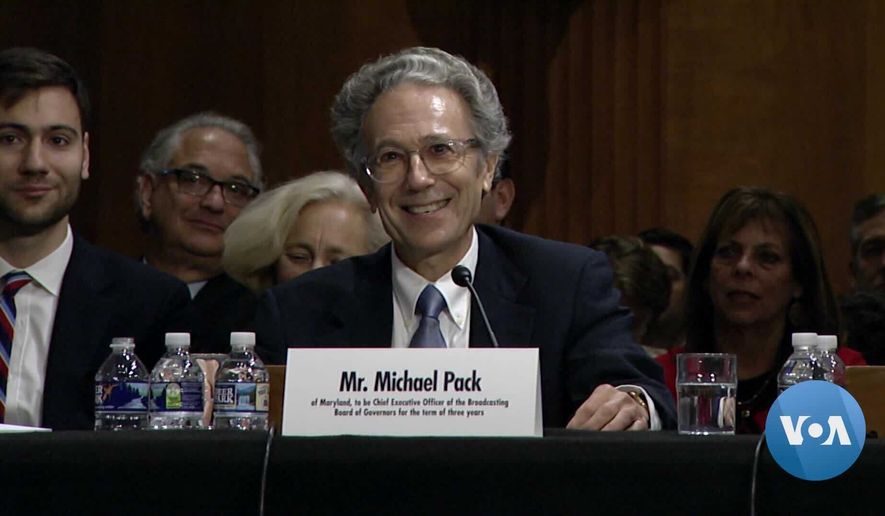The head of U.S. foreign broadcasting is clashing with the taxpayer-financed fund to promote open internet access around the world, saying the Open Technology Fund management is opposing efforts to monitor its funding.
Michael Pack, the new chief of the U.S. Agency for Global Media (USAGM), criticized the resistance to oversight at the fund, which receives about $20 million a year.
“The campaign being waged by individuals who seem more concerned about covering up corruption and past failures than working on behalf of the American people should outrage every American citizen,” Mr. Pack said in a statement posted on the USAGM website.
“In particular, the personal and false attacks launched against [USAGM lawyer] Mora Namdar and other members of my staff working to advance freedom and human rights are totally without merit,” he stated.
Mr. Pack dismissed the head of the Open Technology Fund, former Radio Free Asia Director Libby Liu, in June along with the directors of the official and semi-official U.S. government broadcasting arms in what he described as a corporate-style shake-up of the U.S. government’s main international media outlets.
The fund in turn has sued to prevent Mr. Pack’s moves to take control of the organization and has won a temporary reprieve.
OTF officials last week filed a lawsuit claiming the fund is a target of Trump administration harassment and its activities should not be subject to USAGM oversight.
The lawsuit claimed that Ms. Namdar “launched a campaign of harassment — repeatedly threatening OTF’s grant funding unless it complied with a seemingly endless series of demands to immediately provide information, documents, interviews and on-site inspections.”
The fund also alleged in its lawsuit that USAGM has withheld nearly $20 million in funding for OTF.
Ms. Namdar notified the fund on Aug. 18 that the group would be in material breach of its grant agreement unless it provides 18 categories of information about its activities.
If the information is not supplied in 10 days, USAGM could defund the group.
Mr. Pack said in his statement that Ms. Namdar is “a patriotic public servant” who worked as a senior State Department adviser before signing on at USAGM.
“The attempts of those with money and power to disparage her are transparent, weak, and without merit,” Mr. Pack said.
Mr. Pack said he suspects that the fund is seeking to “foment scandal” in a bid to “distract from its numerous serious lapses and unwillingness to be transparent about its activities.”
A recent Office of Personnel Management report faulted previous USAGM leaders for failing to conduct stringent background checks on foreign nationals from states such as China, Russia and Iran who work for Voice of America, Radio Free Europe/Radio Liberty and other traditional U.S. government-funded outlets.
Mr. Pack’s arrival has sparked a sharp debate over the role of the media arms in reporting to the world from an American government perspective.
“My staff and I will continue to aggressively defend U.S. national security interests and fulfill the important mission of the agency,” Mr. Pack said. “OTF’s attacks are not only upon individual civil servants, but also upon the very institutions of the federal government that exist to serve and protect Americans.
“We will not be deterred by attempts, ideological and otherwise, to harass and slander us in the press and elsewhere.”
Requests for comment from the OTF were not answered.
According to USAGM, the global internet fund was set up in 2012 by Ms. Liu, then the director of Radio Free Asia, as a small group within RFA. The project received funds from USAGM’s office of internet freedom and had a staff of three or four experts.
Mr. Pack recently revived the office of internet freedom within USAGM, which was shuttered during the Obama administration in favor of funding the separate OTF.
A USAGM official told The Washington Times that Ms. Liu ran afoul of the agency’s inspector general over concerns that RFA was granting contracts in an improper manner.
Ms. Liu then sought funds for “open technology” projects from the office of internet freedom and eventually obtained all funds meant for the office.
In 2019, Ms. Liu, who paid herself a salary of over $193,000, then unilaterally split the Open Technology Fund from RFA by incorporating the fund as a private nonprofit. She placed herself as the director — a move the USAGM official said was not authorized by Congress. Critics also say no U.S. taxpayer funds had been allocated specifically for the OTF.
The staff of the fund then grew to over 10 people and moved to expensive office space on L Street Northwest.
Ms. Liu, who is listed as co-founder emeritus on the OTF website, could not be reached for comment.
The USAGM official said the fund was paying millions of dollars to a private group for work that could have been done by the USAGM unit at a fraction of the cost. Also, concerns were raised within USAGM over the fund’s projects that appear to have little to do with overcoming foreign barriers to internet access and debate.
In an email note, Ms. Liu praised what she said was OTF’s “flexible, transparent, and competitive funding model.”
“I have become aware of lobbying efforts to convince the new USAGM CEO to interfere with the current FY2020 OTF funding stream and redirect some of our resources to a few closed-source circumvention tools,” she wrote in the June 13 email, according to the online news outlet Vice. “While I am still permitted to stay in my seat, I will continue to work to protect this organization.”
Mr. Pack terminated her and the OTF board four days later, Vice reported.
• Bill Gertz can be reached at bgertz@washingtontimes.com.




Please read our comment policy before commenting.